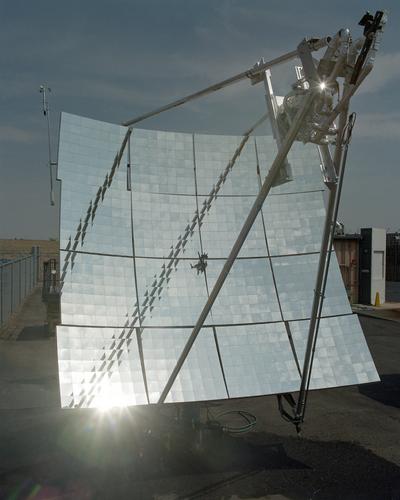Photo courtesy of NREL/HeliostatPosted 4/22/09 by
Yasha Husain
Increasingly, concentrated solar power (CSP), and concentrated photovoltaic systems (CPV), are coming online.
CSP plants, because of their size and cost, and the fact that they require direct radiation, or more intense sunlight for a certain number of hours in the day, are typically utility-scale projects installed in the world's sunniest places.
CPV, on the other hand, can more easily be used in diffuse radiation, or sunlight, to help municipalities, industry, and the hospitality business, meet their water heating and electricity needs.One example of breakthrough CPV technology is from Zenith Solar:
For the latest in
solar energy
developments, visit:National Renewable
Energy Lab
Solar Today
Renewable Energy
Advice
from Mother Earth News
Planet Ark
For a complete listing of
US local, state, and federal
solar incentives, visit:DSIRE
Database of Incentives
Keep up-to-date
with US Policy
via:
The White House Agenda
Energy and Environment
Pageand
Article - Culture
UN Should Do Re-Do
by Yasha Melanie Husain
Posted August 23, 2009
In 2009, we are living in a time when the winds of change are blowing strong in two directions, toward progress and international unity, and fundamentalism and divisiveness. It would be wise to circumvent the anger that is stirring fundamentalist reactions among pockets of the world’s people where there is also a degree of resentment toward modernity and the role of the American hegemony since the days of the Cold War.
Perhaps the best way to do this is to turn again to the United Nations for support, but to this time not give up until international agreement on the best way forward has been attained.
Agreement in the form of international treaties and commissions sent to do specific jobs such as tallying re-votes, arguably, could bring about peaceful resolve where and when it’s needed, in nations both developed and developing.
The greatest example at the moment, and possible solution to an issue that seems to crop up with some regularity around the world, stems from a reflection on Iran’s latest elections. They were quickly contested, and this could or could not have foretold future events going awry. But what if when a nation suffers a setback in free elections an international commission from the UN intervenes immediately to call for re-elections? And what if the commission would also be responsible for administering and tallying the re-vote with complete transparency? Since national elections have far-reaching effects on international peace and prosperity, and since the commission would simultaneously serve to protect people’s human rights, wouldn’t such a commission be warranted and even welcomed?
Would it help ensure democratic votes are always democratic; or would it only make it conceivable that people in power or seeking power would occasionally try and sway the judgment of those leaders who are part of the UN’s commission for national elections?
For now, it seems a new UN commission could be a rational means of extending a hand to nations, and the larger international community, at election time. The UN is the most reliable organization able of supplying observers and objective actors to help uphold the rule of law of any nation, as nations are also bound by the law of nations, or international law.
The Electoral Assistance Division within the Department of Political Affairs at the UN already has ample experience with providing assistance at election time, and a new commission could become an arm of support to individuals in advanced as well as developing countries at their time of need surrounding national elections.
The commission might respond to a petition from one-fifth of a nation’s population, or else to media reports of considerable controversy surrounding voting. But no matter how it is decided that it ultimately will become involved, it will again answer the UN Charter, and more specifically Article 21 of the Universal Declaration of Human Rights, which states:
There is no body besides the UN that would be better suited to intervene peacefully in a nation in such a way to redo elections a second time to ensure the original results were not rigged. The proposed commission, if accepted, would promote world peace. It could provide people around the world greater human rights protection under the law, and at the same time preclude a nation sacrificing its sovereignty.
I draw this last conclusion, and not the conclusion that nations would be handing over their sovereign rights to an international body with no assurances, because the job of the commission would not be to alter law, but merely to help a government uphold its constitutional obligations to its people under both national and international law. So, rather than usurp the sovereignty of any nation by re-doing elections, the commission would be exerting itself as a peaceful instrument and extension of the law for the protection of the will of the people and human rights.
The high level of transparency at the level of the UN could help nations rich and poor, large and small, overcome claims of voting fraud as well as the problems that often ensue following corrupted, questionable and too-close-to-call elections.
I believe in 2002 and 2003, too, if the United States stuck it out and cooperated with the UN to see its way forward, albeit under different circumstances, the transparency required would have made the path ahead easier in the years that followed.
If as an international institution the UN were more frequently relied on to broker world affairs, in accordance with international law, the world could become a safer place. Perhaps the UN can strategically and justly intervene to re-do national elections whenever deemed appropriate, and in so doing provide a higher degree of political stability.
Article Posted August 23, 2009
|
||||
